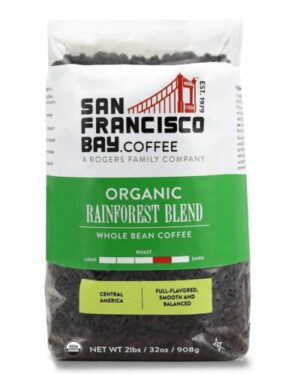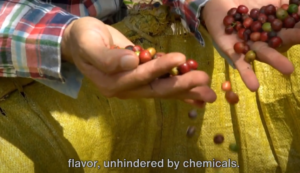
Organic coffee has become increasingly popular among health-conscious consumers and coffee enthusiasts alike. With a growing demand for sustainably sourced, chemical-free products, the market for organic coffee beans has expanded significantly.
This review explores the top 12 organic coffee options available on Amazon, highlighting their unique features, flavor profiles, and overall quality.
PureCoffeeCraft is a participant in the Amazon Services LLC Associate Program, an affiliate advertising program designed to provide a means for sites to earn advertising fees by advertising and linking to Amazon.com. There is no extra cost to consumers for clicking on the following links.
Purity Coffee: A Health-Focused Approach
Purity Coffee stands out for it’s unwavering commitment to producing coffee that maximizes health benefits. Their rigorous sourcing and testing processes ensure a product free from pesticides, mold, and mycotoxins.
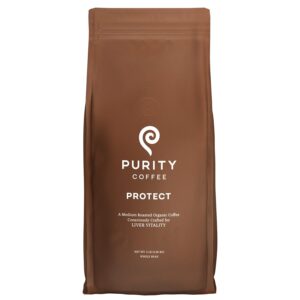
PROTECT Highest Antioxidant Light-Medium Roast
This light-medium roast boasts the highest levels of antioxidants among Purity’s offerings. With a taste profile featuring roasted hazelnut and brown spice notes, it’s an excellent choice for those seeking both flavor and health benefits.
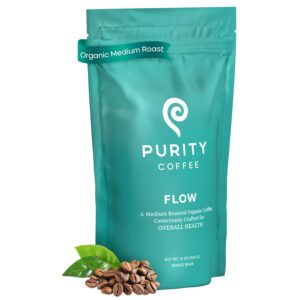
FLOW Medium Roast
Designed to promote clean and sustained energy, the FLOW Medium Roast offers a balanced flavor with hints of roasted nuts and milk chocolate. It’s an ideal option for daily consumption.
Lifeboost Coffee: Low Acid, High Quality
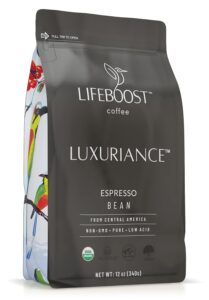
Lifeboost Coffee specializes in low acid coffee, making it a great choice for people who have sensitive stomachs or acid reflux issues. Their beans are grown at high altitudes in Nicaragua and undergo rigorous third-party testing.
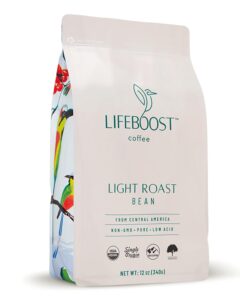
Luxuriance Organic Espresso Beans
These whole bean espresso beans deliver a rich, full-bodied flavor perfect for espresso lovers. The low acid content makes it easier on the stomach without compromising taste.
Light Roast Coffee Beans
Sourced from Central America, this light roast offers a bright, crisp flavor profile. It’s an excellent choice for those who prefer a milder coffee with subtle nuances.
San Francisco Bay Coffee: Responsibly Sourced Blends
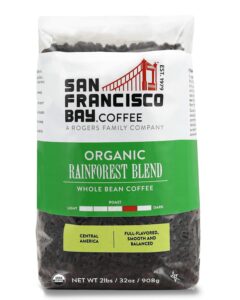
San Francisco Bay Coffee combines great taste with social responsibility, ensuring 100% of their coffee purchases are responsibly sourced.
Organic Rainforest Blend
This medium-dark roast whole bean coffee offers a rich, full-bodied flavor with a smooth finish. It’s an excellent everyday coffee for those who appreciate a bolder taste.
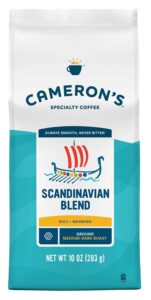
Cameron’s Coffee: Specialty Grade Arabica
Cameron’s Coffee focuses on small-batch roasting to ensure optimal flavor and freshness.
Organic Scandinavian Blend
This medium-dark roast whole bean coffee delivers a smooth, balanced flavor with low acidity. It’s perfect for those who enjoy a rich coffee without bitterness.
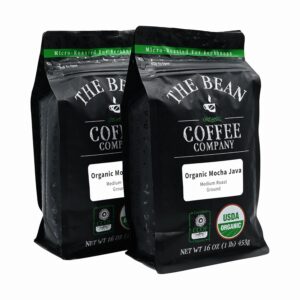
The Bean Coffee Company: Maximizing Health Benefits
The Bean Coffee Company roasts their coffee to maximize health benefits while preserving taste and quality.
Organic Mocha Java
This medium roast whole bean coffee offers a classic flavor profile with hints of chocolate and nuts. It’s a versatile coffee suitable for various brewing methods.
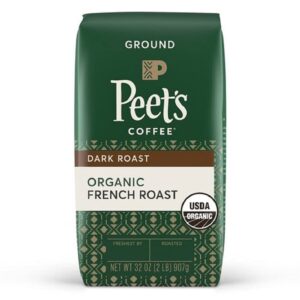
Peet’s Coffee: Deep Roasts and Rich Flavors
Peet’s Coffee is known for it’s deep roasts and bold flavors.
Organic French Roast
This dark roast coffee features beans from Latin American origins, resulting in a bold, complex flavor profile. It’s ideal for those who prefer a strong, intense coffee experience.

Mt. Comfort Coffee: Single Origin Excellence
Mt. Comfort Coffee focuses on single-origin beans to highlight unique flavor profiles.
Organic Peru Medium Roast
Sourced from small Peruvian farms, this medium roast offers flavor notes of nuts, chocolate, and citrus. It’s a great choice for those who appreciate the nuances of single-origin coffee.
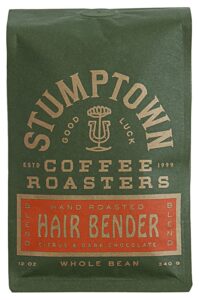
Stumptown Coffee Roasters: Direct Trade Champions
Stumptown Coffee Roasters is committed to direct trade relationships with coffee producers.
Holler Mountain Medium Roast
This organic whole bean coffee features flavor notes of citrus zest, caramel, and hazelnut. It’s a well-balanced coffee suitable for various brewing methods.
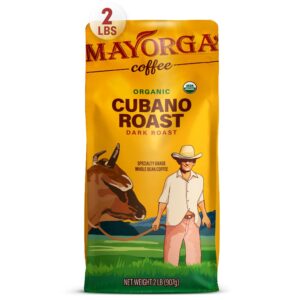
Mayorga Coffee: Specialty Grade and Farmer Direct
Mayorga Coffee specializes in organic, farmer-direct, specialty-grade coffee.
Cubano Roast Dark Coffee
This dark roast whole bean coffee offers a bold, intense flavor profile. It’s perfect for those who enjoy a strong, full-bodied coffee.
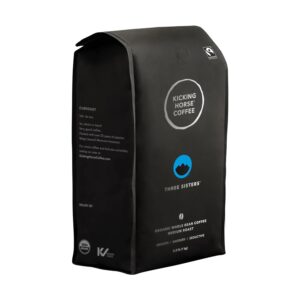
Kicking Horse Coffee: Fair Trade and Organic
Kicking Horse Coffee is committed to both fair trade practices and organic cultivation.
Three Sisters Medium Roast
This medium roast ground coffee offers a smooth, well-balanced flavor profile. It’s an excellent choice for those who prefer a versatile, everyday coffee.
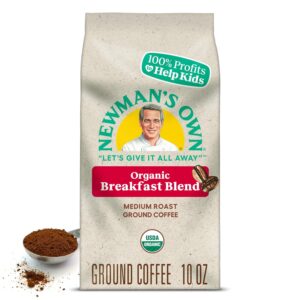
Newman’s Own Organic Coffee: Coffee with a Cause
Newman’s Own combines great-tasting coffee with charitable giving.
Breakfast Blend Medium Roast
This medium roast ground coffee offers a smooth, balanced flavor perfect for morning consumption. It’s an excellent choice for those who appreciate coffee with a social impact.
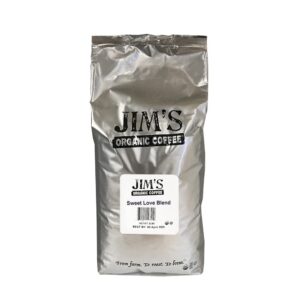
Jim’s Organic Coffee: Artisan Roasted Excellence
Jim’s Organic Coffee focuses on artisan roasting and long-standing relationships with growers.
Sweet Love Blend Dark Roast
This dark roast ground coffee offers a bold, rich flavor profile. It’s ideal for those who enjoy a strong coffee with depth and character.
| Brand | Roast Level | Flavor Profile | Unique Features |
|---|---|---|---|
| Purity Coffee | Light-Medium to Medium | Varies by blend | Highest antioxidant levels, rigorously tested |
| Lifeboost Coffee | Light to Dark | Varies by blend | Low acid, stomach-friendly |
| San Francisco Bay Coffee | Medium-Dark | Rich, full-bodied | 100% responsibly sourced |
| Cameron’s Coffee | Medium-Dark | Smooth, balanced | Small-batch roasted |
| The Bean Coffee Company | Medium | Classic, nutty | Roasted to maximize health benefits |
| Peet’s Coffee | Dark | Bold, complex | Deep roast specialist |
| Mt. Comfort Coffee | Medium | Nutty, chocolate, citrus | Single-origin focus |
| Stumptown Coffee Roasters | Medium | Citrus, caramel, hazelnut | Direct trade relationships |
| Mayorga Coffee | Dark | Bold, intense | Specialty-grade, farmer-direct |
| Kicking Horse Coffee | Medium | Smooth, balanced | Fair trade certified |
| Newman’s Own Organic Coffee | Medium | Smooth, balanced | Proceeds go to charity |
| Jim’s Organic Coffee | Dark | Bold, rich | Artisan roasted, long-standing grower relationships |
These top 12 organic coffee options on Amazon offer a diverse range of flavors, roast levels, and unique features to suit various preferences. From health-focused brands like Purity Coffee to socially responsible options like Newman’s Own, there’s an organic coffee for every discerning coffee lover.
By choosing these organic options, consumers support sustainable farming practices, fair trade, and often contribute to charitable causes, all while enjoying high-quality, flavorful coffee.
The Rise of Organic Coffee: A Sustainable Revolution in Your Cup
The coffee industry has undergone a significant transformation in recent years, with organic coffee emerging as a powerful force in the market. This shift reflects a growing consumer awareness of health, environmental sustainability, and ethical sourcing practices.
As more coffee drinkers seek out organic options, it’s essential to understand the impact and benefits of this trend.
The Organic Coffee Movement: More Than Just a Trend
Organic coffee production has evolved from a niche market to a mainstream choice for many consumers. This change is driven by several factors:
Health Consciousness
Many coffee drinkers are increasingly concerned about the potential health impacts of pesticides and chemicals used in conventional coffee farming. Organic coffee, grown without synthetic pesticides or fertilizers, appeals to health-conscious consumers looking to reduce their exposure to potentially harmful substances.
Environmental Sustainability

Organic coffee farming practices prioritize environmental conservation. These methods often include:
- Shade-grown cultivation, which preserves forest canopies and biodiversity
- Natural pest control methods that maintain ecological balance
- Soil conservation techniques that prevent erosion and maintain soil health
Ethical Sourcing and Fair Trade
Many organic coffee brands also emphasize fair trade practices, ensuring that coffee farmers receive fair compensation for their work. This ethical approach resonates with consumers who want to support sustainable livelihoods in coffee-growing regions.
The Impact of Organic Coffee Production
The rise of organic coffee has had far-reaching effects on both the environment and coffee-growing communities:
Biodiversity Conservation
Organic coffee farms often serve as havens for wildlife, particularly bird species. The preservation of native trees and plants in shade-grown coffee farms creates crucial habitats for various species.
Soil Health
Organic farming practices promote long-term soil health by avoiding harmful chemicals and encouraging natural fertilization methods. This approach helps maintain soil fertility and reduces the need for synthetic inputs over time.
Water Conservation
Organic coffee farming typically uses less water than conventional methods, as it relies more on natural rainfall and efficient irrigation systems. This practice is particularly crucial in regions facing water scarcity.
Community Development
Many organic coffee initiatives include community development programs, providing education, healthcare, and infrastructure improvements in coffee-growing regions. These efforts help create more sustainable and resilient communities.
Challenges and Opportunities in Organic Coffee Production
While the organic coffee sector continues to grow, it faces several challenges:
Yield and Productivity
Organic coffee farms often have lower yields compared to conventional farms, which can impact farmer incomes. However, innovative organic farming techniques are continually being developed to improve productivity.
Certification Costs
The process of obtaining organic certification can be expensive and time-consuming for small-scale farmers. Some organizations are working to make certification more accessible and affordable.
Climate Change
Changing weather patterns and increasing temperatures pose significant challenges to coffee production. Organic farming methods, which often prioritize resilience and adaptability, may offer some solutions to these challenges.
The Future of Organic Coffee
The global market for organic coffee is growing, estimated to be $12.9 Billion by 2030. As consumer demand for organic coffee continues to grow, the industry is likely to see further innovations and developments:
Technological Advancements
New technologies in organic pest control, soil management, and processing methods are being developed to improve the efficiency and quality of organic coffee production.
Expanded Variety
As more regions adopt organic farming practices, consumers can expect a wider variety of organic coffee options, including rare and specialty varieties.
Making Informed Choices as a Consumer
For coffee lovers looking to support sustainable and ethical practices, consider the following when choosing organic coffee:
- Look for reputable certifications such as USDA Organic, Fair Trade, or Rainforest Alliance
- Research brands to understand their sourcing practices and commitment to sustainability
- Consider supporting smaller, specialty roasters who often have direct relationships with coffee farmers
- Be willing to pay a premium for high-quality organic coffee, recognizing the extra costs involved in it’s production
| Aspect | Conventional Coffee | Organic Coffee |
|---|---|---|
| Pesticide Use | Synthetic pesticides allowed | No synthetic pesticides |
| Fertilizers | Synthetic fertilizers common | Natural fertilizers only |
| Environmental Impact | Potentially harmful to ecosystems | Promotes biodiversity and soil health |
| Certification | No specific certification required | Requires organic certification |
| Price | Generally lower | Often higher because of production costs |
The rise of organic coffee represents a significant shift towards more sustainable and ethical coffee production.
Frequently Asked Questions
Is organic coffee more expensive than regular coffee?
While organic coffee can be slightly more expensive, the price difference has narrowed in recent years. Many consumers find the quality and ethical benefits worth the small premium.
Does organic coffee taste different from conventional coffee?
In my experience, organic coffee often has a cleaner, more distinct flavor profile. The absence of synthetic chemicals in the growing process can allow the natural flavors of the coffee to shine through more clearly.
How do I know if my coffee is truly organic?
Look for certifications like USDA Organic or similar international standards on the packaging. These certifications ensure that the coffee has been grown and processed according to strict organic guidelines.
Can organic coffee be decaf?
Yes, there are many organic decaf options available. These coffees are typically decaffeinated using natural processes that align with organic standards.
The Social Impact: Supporting Coffee Communities
Another aspect of organic coffee that resonates with me is it’s potential for positive social impact. Many organic coffee brands work directly with small-scale farmers, ensuring fair wages and supporting community development projects.
By choosing organic, I feel like I’m not just buying coffee, and investing in the well-being of global coffee-growing communities.
Storage Tips: Preserving Freshness
To maintain the quality of organic coffee, proper storage is crucial. I keep my beans in an airtight container, away from light, heat, and moisture.
For the best flavor, I try to use the beans within two weeks of opening the package and grind them just before brewing.
